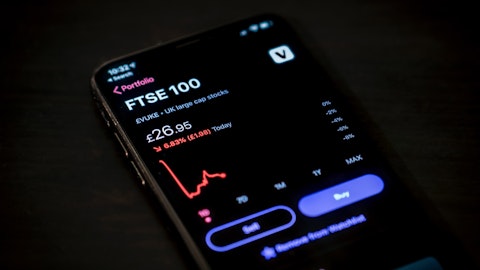Thomas Broughton: It’s for the General Bank, Graham, on noninterest-bearing, I think. We are a business bank. And so we have significant size accounts. So we could have one that goes up or down $50 million in a quarter and it might be at the quarter end. So we could — we might — we held in steady, but next quarter, we might be down $100 million or might be up $200 million at the end of the next quarter. So I can’t represent because we are a business bank and we do have significant sized customers. So it can vary a bit. But we don’t — we had less far to fall than a lot of the older banks. I remember years ago, Harry Brock, who was Chairman and CEO of Compass Bank, he is the founder of the bank. And he — I was working for what is now Regions Bank.
It was AmSouth Bank, and he’ll say, I got a lot of lazy money at your bank, Tom, and I didn’t quite understand what he meant, but over time, I learned what Harry meant about the lazy money. And I think when you’ve got a 100-year-old bank charter that’s just — they’ve got a lot higher noninterest-bearing deposits, and they’ve got further to fall than we do. So it’s probably good news for us.
Graham Dick: Yes, definitely. And the last question for me is just — it looks like you guys added to the bond portfolio this quarter. I just wanted to get a little color on your decision and thought process behind that. And then maybe what rates you bought those bonds at and the duration of them or anything like that would be great.
William Foshee: Yes, Graham, it’s Bud. Really, a lot of that had to do with pledging.
Thomas Broughton: We didn’t need to pledge anything, but we did. We just got — we’ve got it in case we needed for collateral. We add what do we add $350 million in 6 months and less in treasuries?
William Foshee: Yes. And the yield 5.35%, 5.40%, and it reduced our average life to 3.2 years also on the entire portfolio.
Thomas Broughton: Little better yield than you get at the Fed. So that’s the logic behind it. We don’t need it for pledging.
Operator: Our next question is from David Bishop with Hovde Group.
David Bishop: Follow up on that question, and I couldn’t help but notice that the end of period balances on investment and even deposits was much higher than the average balance. Is that a function [indiscernible] some of those correspondent relationships sort of coming online later in the quarter. Just curious if there was any sort of timing around the — was it sort of a late quarter surge in funding growth?
Thomas Broughton: It was not a late quarter surge in correspondent balances. I know we had a large municipal deposit that came in right at the end of the — I don’t know exactly when in the quarter. You remember Bud, exactly was….
William Foshee: [Indiscernible].
Thomas Broughton: Pretty late in the quarter. It will be here a while, and it’s a municipal. A lot of the COVID-money federally stimulus — federal stimulus money is starting to make its way down to state local municipalities. So that’s what — that affected it to date.
David Bishop: Okay. Got it. Then Rodney staying sensitive, I know you guys always don’t like to give away the plumbing in terms of the interworking. So the correspondent division I know we had you on the road last month. Tends to remain relatively profitable despite what rates are doing. But I noticed that the decline in third-party service charges, is that a function of you handling more accounts, sweeping more into the Fed service here or maybe what’s driving that down on a quarter-to-quarter basis, the third-party processing no fees.





